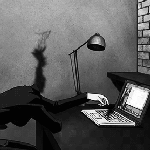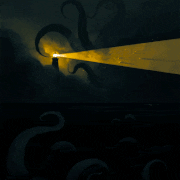Trabant posted:
Harald wanted to marry his daughter, Jelisaveta, but Yaroslav said that he wasn't rich enough and without land. But he thought that Harald would someday be a bigshot and he wouldn't refuse him if he came back a wealthier man. And after returning from Byzantine he got Jelisaveta's hand in marriage. While in Byzantine Harald Hardråde became known as the "Bulgarian Burner" because he squashed a bulgarian rebellion and cut off the nose and blinded the leader of the rebellion.
|
|
|
|
|

|
| # ? Apr 29, 2024 12:21 |
|
The term "bootleg" came about back in the early 19th century when men would hide flat bottles of whiskey in their boots to sell to the Native Americans, which was illegal. I always thought that was a weird word, and now I wonder if that explains the sight curve that metal flasks and some bottles have.
|
|
|
|
christmas boots posted:I wonder what the first instance of pranking a rookie by sending him on a bullshit errand or making up a fake tradition to make him look stupid was like. Done properly, it's a fun way to introduce the New Guy to everyone he needs to know and where they work, without tying up someone supervising him the whole day.
|
|
|
|
A lot of Norse adventurer types spent some time as Varangian Guards (væringjar) in Constantinople (Mikligarður). Haraldur Harðráði is simply the most notable one. There's even some runic graffiti in the Hagia Sofia that's basically "Árni wuz here".
|
|
|
|
I love that graffiti has basically been the same exact thing since the dawn of civilization
|
|
|
|
oh dope posted:the sight curve that metal flasks and some bottles have. Isn’t that because they’re hip flasks and worn on the hip?
|
|
|
|
christmas boots posted:I love that graffiti has basically been the same exact thing since the dawn of civilization historical graffiti owns, but modern graffiti on historical things don't some rear end in a top hat hosed up 9000 year old animal carvings in Norway https://www.nrk.no/nordland/verre-enn-forst-antatt_-_-kan-bli-staende-i-hundrevis-av-ar-1.14631829
|
|
|
|
On graffiti talk, there are hundreds of tiny crosses on the columns at the entrance of Church of the Holy Sepulchre, which for those that don't know is where Jesus is said to have been crucified, laid to rest, and where he was resurrected. The reason for all those tiny crosses? Early pilgrims were illiterate and simply weren't able to pray. So they carved a little bit of the column and took the sliver of stone home with them, as a sign of faith.  I was in Israel a couple of weeks ago, I can share more fun facts about the area if y'all are interested. Lord Lambeth has a new favorite as of 04:48 on Jul 25, 2019 |
|
|
|
Krankenstyle posted:historical graffiti owns, but modern graffiti on historical things don't Give it 9000 years, it'll be really cool
|
|
|
|
Lord Lambeth posted:On graffiti talk, there are hundreds of tiny crosses on the columns at the entrance of Church of the Holy Sepulchre, which for those that don't know is where Jesus is said to have been crucified, laid to rest, and where he was resurrected. The reason for all those tiny crosses? Early pilgrims were illiterate and simply weren't able to pray. So they carved a little bit of the column and took the sliver of stone home with them, as a sign of faith. Please do!
|
|
|
FreudianSlippers posted:A lot of Norse adventurer types spent some time as Varangian Guards (væringjar) in Constantinople (Mikligarður). Haraldur Harðráði is simply the most notable one. It is also worth noting that by the 11th century the varangian guard primarily consisted of anglo-saxons and by the the 13th century it did almost exclusively consists of greeks. 1110 was probably the last time when the majority of the guard was norse. This was because Sigurd Jorsalfare (Sigurd Who Went To Jerusalem) let 6000 of his men join the guard after participating in the first crusade.
|
|
|
|
|
There was still a law that no man who is in Greece can inherit when the Swedish äldre västgötalagen was written down in 1220. So I would assume that it was still a thing to go there even if not in the same numbers.
|
|
|
|
Alhazred posted:It is also worth noting that by the 11th century the varangian guard primarily consisted of anglo-saxons and by the the 13th century it did almost exclusively consists of greeks. It's cool when a language is still so close that when the etymology of something like a name is pointed out, it's still very obvious, even after 1000+ years of language drift between Norse and English. "Jorsalfare" is just Jorsal/Jerusalem and "fare", i.e a Swedish word for go/travel (fara) or the old english "fare" (travel) that is not used on it's own anymore, but is still within words like farewell, wayferer, seafarer, etc.
|
|
|
|
It's used now to mean "the money you pay for a ride on public transport".
|
|
|
|
Trabant posted:

|
|
|
|
bony tony posted:It's used now to mean "the money you pay for a ride on public transport". "Fare" in the sense of payment for passage/transportation dates to Scotland in the 1510s, and as a passenger or person conveyed in a vehicle, the 1560s. All the same root: quote:Old English fær "journey, road, passage, expedition," from strong neuter of faran "to journey" (see fare (v.)); merged with faru "journey, expedition, companions, baggage," strong fem. of faran. Fascinatingly, "fare" as "food, provisions" comes from the same root and dates back to the 12th century. See also German fahren, to travel, drive. "Farewell" and "to fare (well or badly)" meaning to have a certain degree of success or failure in a particular endeavor are also from the same root. Language! 
|
|
|
|
At Spotsylvania Court House Virginia, on May 9th, 1864 the 6th corps of the union Army of the Potomac was probing the Confederate Army of Northern Virginia's prepared entrenchments following the Battle of the Wilderness. While union troops and artillery moved into position, a group of Confederate sharpshooters (the 19th century version of snipers) noticed a group of Union officers, and opened fire on them when they came within 1,000 yards. The commander of the 6th corps was General John Sedgwick and it was he and his staff that the Confederate sharpshooters began to shoot at. As Sedgwick and his staff came under Confederate fire, Sedgwick's staff started to rather excitedly tell him that he should take cover. Sedgwick being the brave and experienced officer he was, responded "you worry too much! They couldn't hit an elephant from this dist..." At which point, a .69 caliber round fired from a Confederate sharpshooter's Harpers Ferry Rifle struck Sedgwick in the head. Given the caliber of the weapon with which Sedgwick was hit, his head suffered a catastrophic failure and exploded. Obviously Sedgwick was killed instantly, unfortunately interrupting the man's attempt to reassure his staff mid sentence. These are my favorite last words ever. ZombieLenin has a new favorite as of 14:39 on Jul 25, 2019 |
|
|
|
ZombieLenin posted:At Spotsylvania Court House Virginia, on May 9th, 1864 the 6th corps of the union Army of the Potomac was probing the Confederate Army of Northern Virginia's prepared entrenchments following the Battle of the Wilderness. While union troops and artillery moved into position, a group of Confederate sharpshooters (the 19th century version of snipers) noticed a group of Union officers, and opened fire on them when they came within 1,000 yards. I will be needlessly pedantic and note that those probably weren't his last words (though they were close to being so) and he was killed by a Whitworth rifle, most of which were chambered in .451.
|
|
|
|
That's not a very nice caliber
|
|
|
|
bony tony posted:That's not a very nice caliber I'm no gun expert but I don't think they make 69 caliber rounds?
|
|
|
|
Government Handjob posted:I'm no gun expert but I don't think they make 69 caliber rounds? They made .69 caliber minié balls. Muzzle-loaders had pretty giant calibers by modern standards.
|
|
|
|
Lord Lambeth posted:Early pilgrims were illiterate and simply weren't able to pray.
|
|
|
|
ZombieLenin posted:At Spotsylvania Court House Virginia, on May 9th, 1864 the 6th corps of the union Army of the Potomac was probing the Confederate Army of Northern Virginia's prepared entrenchments following the Battle of the Wilderness. While union troops and artillery moved into position, a group of Confederate sharpshooters (the 19th century version of snipers) noticed a group of Union officers, and opened fire on them when they came within 1,000 yards. "What are you gonna do, snipe me?"
|
|
|
|
InediblePenguin posted:???????? Latin yo
|
|
|
|
Dannywilson posted:Latin yo I just don't understand why you would be completely unable to pray just because you can't read the words... People like memorized prayers all the time, yo I honestly think that carving crosses into things and taking home bits of rock are activities that are not in fact directly related to illiteracy and are just the way people act and I'm 100% sure that people prayed regularly in history times despite not reading Latin
|
|
|
|
InediblePenguin posted:???????? I'm just repeating myself there, they weren't able to pray because they were illiterate. Nevermind that there weren't as many translations as there are today.
|
|
|
Government Handjob posted:I'm no gun expert but I don't think they make 69 caliber rounds? It's mixed up in a few different ways. Along with the aforementioned rifle really being a .451 caliber Whitworth (one of the very few true "sniper rifles" of the time period, even with a scope), .69 caliber was the caliber of ball used in muskets from the Brown Bess and Charleville in Revolutionary times all the way until the Springfield Model 1842. After that they stopped issuing smoothbore muskets and switched to rifles using a .58 caliber Minie ball starting with the Model 1855. While the bullets are very large (because black powder produces lower pressure for the same amount of powder than smokeless, so black powder rounds tend to travel relatively slow), it's actually smaller than the .75 caliber bore diameter. Black powder produces a ton of soot because around half of the combustion products are solids, which rapidly clogs the barrel and action. Undersized bullets were issued because they could easily be forced down the barrel of a muzzleloader even as it was fired multiple times in a battle, at the cost of ruining accuracy so they could only reliably hit a man at 100 yards or less. This changed when the Minie ball was developed, which is smaller than the bore diameter but has a hollow base that expands upon firing to grip the rifling, giving you a muzzleloading rifle that's as fast to reload as a musket (and part of why the Civil War was so bloody, as their tactics insufficiently changed to reflect that their guns were now extremely accurate). Then the development of the metallic cartridge casing allowed for safe and reliable breechloaders, leaving muzzleloaders to disappear from the battlefield. InediblePenguin posted:I just don't understand why you would be completely unable to pray just because you can't read the words... People like memorized prayers all the time, yo They did indeed memorize prayers. The bigger problem was the average person couldn't read the Bible because either they were completely illiterate or it was written in a language they didn't know, which put biblical interpretation entirely in the hands of the organized church. The expansion of literacy and development of the printing press changed this dynamic by creating Bibles that more and more people were able to read for themselves.
|
|
|
|
|
Also the reformation, which led to non-Latin bibles
|
|
|
|
Lord Lambeth posted:I'm just repeating myself there, they weren't able to pray because they were illiterate. Nevermind that there weren't as many translations as there are today. Not being able to read/understand Latin doesn't prevent you from memorizing a string of weird sounds though, which is all you need to pray
|
|
|
|
bewbies posted:he was killed by a Whitworth rifle, most of which were chambered in .451. As for them not being his last words, well everyone leans towards the dramatic in war stories, AND it is almost definitely the case he said those words before said sharpshooter sharpshootered him. Edit Incidentally, it turns out that Confederate sharpshooters were quite good. On December 5th, 1864 a Confederate sharpshooter score the longest confirmed kill with a rifle during wartime in the 19th century in Charleston, SC. The Confederate sharpshooter struck and killed a union soldier on Morris Island while shooting from Fort Sumter at a distance of 1,399 yards (1,271m for non-imperial measurement goons). ZombieLenin has a new favorite as of 18:40 on Jul 25, 2019 |
|
|
|
Lord Lambeth posted:I'm just repeating myself there, they weren't able to pray because they were illiterate. Nevermind that there weren't as many translations as there are today. This still doesn't mean that they "weren't able to pray" unless you believe that prayer necessarily involves reading the Bible. Catholicism has tons of prayers that are supposed to be memorised by the faithful, beginning with short ones like the Lord's Prayer and the Ave Maria and ending with really long ones like the Nicene Creed or this super-long prayer to Mary that the old people in my hometown can still recite by heart. This ability was in all likelihood even more prominent in pre-literate times when memorisation was all the more important. And that's while ignoring that prayer doesn't even need to be formalised, but at its core is an individual person's call to God. The people back then were absolutely able to pray, illiterate or not - I would assume that the practice of cutting out crosses from the columns is more a combination of creating relics that could be brought back home, doing it as part of a "practical", non-verbal act of prayer (like making the sign of the cross, but more permanent) and a pious substitute for an "I was here" graffito for people who weren't able to write that down. e: Krankenstyle posted:Also the reformation, which led to non-Latin bibles Not quite - while the Reformation certainly lead to the popularisation and propagandation of non-Latin bibles, the first appearance of biblical translations into popular languages in print came decades before Luther, beginning with the German "Mentelin-Bible" of 1466 which itself used a translation dating back to the 14th century. Biblical translations before Luther were relatively rare, but far from being unheard of. 
System Metternich has a new favorite as of 18:38 on Jul 25, 2019 |
|
|
|
I've just been reminded of how I learned to bless myself and say the Hail Mary in gobbledygook irish because in my school we had to say that prayer at the start of every class, and in Irish class it had to be in irish, except no-one ever bothered to teach me the words so I just learned to make the right noises.
|
|
|
|
System Metternich posted:And that's while ignoring that prayer doesn't even need to be formalised, but at its core is an individual person's call to God. I seem to recall reading that this democratized version of prayer, unmediated by a priest, is a relatively new phenomenon. Ordinary people weren't supposed to talk to God; you needed a go-between who had the proper religious training. Hence priests saying prayers on behalf of others, and the massive mail-order prayer scam that one French priest ran. Religion especially back then had a lot in common with what we'd nowadays call magic: there were formal rituals and invocations you were supposed to perform to achieve specific effects, from exorcising demons to improving crop yield.
|
|
|
|
TooMuchAbstraction posted:I seem to recall reading that this democratized version of prayer, unmediated by a priest, is a relatively new phenomenon. Ordinary people weren't supposed to talk to God; you needed a go-between who had the proper religious training. Hence priests saying prayers on behalf of others, and the massive mail-order prayer scam that one French priest ran. Well, yes... and no. It's obviously hard to not overgeneralise when talking about a time frame of 2000 years, but the common Christian attitudes towards prayer were both very different and very similar to modern ones. People were encouraged, even supposed to pray for themselves (and they absolutely did, see e.g. the enormous popularity of medieval pilgrimages), but the Church also wanted to avoid private prayer evolving into private theologies divergent from official doctrine and therefore encouraged the use of prayer formulas. Unattended, unmediated and non-formulaic prayer still had its place and it wasn't like you could ban thoughts, anyway. Yet the prayer formulas were still extremely popular (and without being able to look into past peoples' heads I'd daresay even more popular than "free" prayer), both because they were officially sanctioned so that people a) didn't need to think of how to address God by themselves and b) couldn't accidentally choose the wrong words while doing so, and because their being sanctioned and their continued usage made them especially holy and "powerful", culminating in those prayers like the Ave Maria and especially the Lord's Prayer who were lifted directly from the Gospel. On the other hand you are right, go-betweens were definitely a thing. Clergy and especially priests were believed to be "holier" or at least closer to God than laypeople and therefore their prayers more powerful than those of John Doe. This clerical intercession wasn't just limited to monks, nuns and priests, but was directly mirrored in the intercession of the saints in Heaven. Intermediate prayer was common; people were paying monastic communities to pray for them - they eased their own prayer load that way, and a monk's prayer was more powerful and effective anyway. Something that also happened a lot was people paying others to go on a pilgrimage on their behald when they themselves couldn't make it for whatever reason. Lastly, there were the Masses. The French priest-hustler you mentioned didn't just offer prayer by mail, but to read Masses on your behalf. It was the common belief within Latin Christianity/Catholicism from the High Middle Ages onwards until well into the 20th century that your soul had to undergo purgatory after death - a place of spiritual cleansing and preparation before you were worthy to enter Paradise. The original belief or purgatory being sort of a spiritual quarantine station soon morphed into purgatory being a gruesome place of pain and misery you had to endure for thousands of years, because this sort of theology was all the rage during the Middle Ages, I guess (it's probably no coincidence that this mental image of purgatory only got really popular after the Black Death). You could shorten your time in purgatory by, well, not being sinful, but seeing as every human being naturally gravitates towards sin your other options were indulgences (i.e. the lessening of your punishment in exchange for certain good deeds or pious practices, and later money) or having Mass read in your name. And here''s the crux: only priests are allowed to read Mass, and the concept of "active participation" of the congregants is something that only came up during the Second Vatican Council of the 1960s. In earlier times this meant paying a priest to read Mass for you or your family, and this is also why the prayers during Mass all had to be said by the priest in addition to what the congregation said or the choir sung, because otherwise the entire Mass wouldn't have been valid.
|
|
|
|
Lord Lambeth posted:I'm just repeating myself there, they weren't able to pray because they were illiterate. Nevermind that there weren't as many translations as there are today. Illiterate means you can't read, not that you do not know what words are
|
|
|
|
The common people being able to access scripture in their own language and learn prayers they actually understood began with Martin Luther and his 95 reasons why gently caress the church
|
|
|
|
christmas boots posted:I love that graffiti has basically been the same exact thing since the dawn of civilization http://www.pompeiana.org/Resources/Ancient/Graffiti%20from%20Pompeii.htm
|
|
|
|
On April 19th, I made bread
|
|
|
|
OnceAndFuture DILF posted:On April 19th, I made bread This could be a euphemism for defecating. You know, like “pinching a loaf”.
|
|
|
|

|
| # ? Apr 29, 2024 12:21 |
|
InediblePenguin posted:Illiterate means you can't read, not that you do not know what words are No, it meant they didn't know what words were, and would frequently become lost mere feet away from home, because they couldn't ask for directions
|
|
|






 Quality advice, Yaroslav living up to his epithet.
Quality advice, Yaroslav living up to his epithet.









































